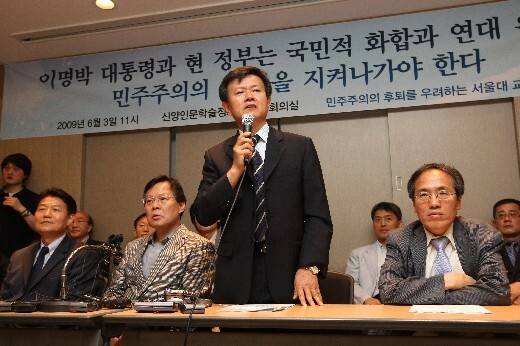hankyoreh
Links to other country sites 다른 나라 사이트 링크
S. Korea’s professors demand a return to democracy

Some 124 professors of Seoul National University issued a declaration Wednesday demanding a government apology for the prosecutors’ investigation of late President Roh Moo-hyun and the guarantee of the freedoms of assembly, association and the press. Another 68 professors at Chung-Ang University also issued a declaration demanding an apology from President Lee for Roh’s death and fundamental policy reform, while professors at Yonsei University, Sungkyunkwan University and Dongguk University will reportedly release statements of their own. Attention is being focused on possible reverberations.
The professors of Seoul National University expressed deep concern for the present state of affairs in their statements, in which they claimed South Korea’s democracy that realized after decades of sacrifice was in trouble. They pointed out that since the inauguration of the present administration, the freedom and independence of the press has been hurt and citizens’ faith in the authority and independence of the judiciary has been undermined. On the matter of the public prosecutor’s investigation into Roh, they said it went against common sense to call it an impartial investigation into official corruption, and there was enough to arouse suspicions that it was an act of political retaliation against the previous administration.
With more groups of professors expected to issue a series of statements, interest is now focusing on how far the upsurge will go. Firstly, the appearance of these university professors’ statements is believed to be proof that there is a widespread understanding among intellectuals that South Korea’s democracy is being seriously damaged. In modern South Korean history, statements by academics have been issued each time democracy has been decisively damaged or placed in a crisis. This means now, 2009, is as grave as the situations of the April 19, 1960 revolutions or the democratic uprising of June 1987. In May 1987, 785 professors of 29 universities, starting with 28 professors from Korea University, issued a flood of professors’ statements calling for direct elections, an immediate implementation of authentic civilian rule, constitutional reform and the guarantee of the freedoms of the press, thought and expression. The matter at that time concluded with the June 1987 Democratic Uprising and the June 29 Declaration.
Some are predicting that these statements are signals of a coming whirlwind in June. A series of large-scale matters of dispute await, including the anniversary of the June 10 Democratic Uprising, memorials for the two girls killed by a U.S. armored vehicle in 2002, the anniversary of the June 15 North-South Joint Declaration, and labor demonstrations. Right away, an alliance of about 30 civic groups, including the People’s Solidarity for Participatory Democracy (PSPD) and Korean Womenlink, is preparing a June 10 rally to commemorate the 22nd anniversary of the June 10 Democratic Uprising that is expected to become a large-scale downtown assembly. PSPD General Secretary Kim Min-young said the professors’ statements reflects the grave imperative needed in the present situation, and that by concentrating citizen opinion and power, the retreat of democracy and the deterioration of the common people’s economic condition needs to be stopped.
Please direct questions or comments to [englishhani@hani.co.kr]
Editorial・opinion
![[Column] Has Korea, too, crossed the Rubicon on China? [Column] Has Korea, too, crossed the Rubicon on China?](https://flexible.img.hani.co.kr/flexible/normal/500/300/imgdb/original/2024/0419/9317135153409185.jpg) [Column] Has Korea, too, crossed the Rubicon on China?
[Column] Has Korea, too, crossed the Rubicon on China?![[Correspondent’s column] In Japan’s alliance with US, echoes of its past alliances with UK [Correspondent’s column] In Japan’s alliance with US, echoes of its past alliances with UK](https://flexible.img.hani.co.kr/flexible/normal/500/300/imgdb/original/2024/0419/2317135166563519.jpg) [Correspondent’s column] In Japan’s alliance with US, echoes of its past alliances with UK
[Correspondent’s column] In Japan’s alliance with US, echoes of its past alliances with UK- [Editorial] Does Yoon think the Korean public is wrong?
- [Editorial] As it bolsters its alliance with US, Japan must be accountable for past
- [Guest essay] Amending the Constitution is Yoon’s key to leaving office in public’s good graces
- [Editorial] 10 years on, lessons of Sewol tragedy must never be forgotten
- [Column] A death blow to Korea’s prosecutor politics
- [Correspondent’s column] The US and the end of Japanese pacifism
- [Guest essay] How Korea turned its trainee doctors into monsters
- [Guest essay] As someone who helped forge Seoul-Moscow ties, their status today troubles me
Most viewed articles
- 1[Column] The clock is ticking for Korea’s first lady
- 2After 2 months of delayed, denied medical care, Koreans worry worst may be yet to come
- 3[Column] Has Korea, too, crossed the Rubicon on China?
- 4US overtakes China as Korea’s top export market, prompting trade sanction jitters
- 5[Editorial] When the choice is kids or career, Korea will never overcome birth rate woes
- 6[Correspondent’s column] In Japan’s alliance with US, echoes of its past alliances with UK
- 7[Photo] Smile ambassador, you’re on camera
- 8Hong Se-hwa, voice for tolerance whose memoir of exile touched a chord, dies at 76
- 9Nearly 1 in 5 N. Korean defectors say they regret coming to S. Korea
- 10Strong dollar isn’t all that’s pushing won exchange rate into to 1,400 range